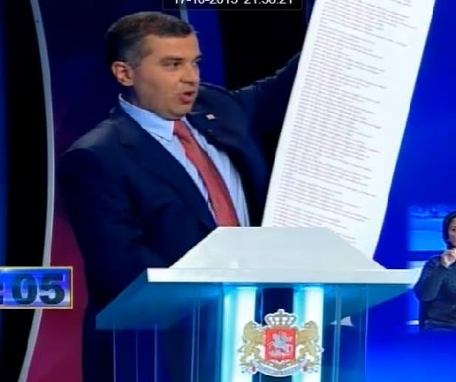
TBILISI, DFWatch–Georgia’s Public Broadcaster October 17 and 18 hosted two TV debates between presidential candidates. Only qualified subjects participated in the debates, those who were presented by the political parties, which receive state funding.
There are only seven qualified subjects among the 23 candidates: Georgian Dream coalition, United National Movement, Christian Democrats, People’s Party, Georgia’s European Democrats, For Fair Georgia and the Christian Democratic People’s Party.
In the debate on October 17, participants were Giorgi Margvelashvili from the Georgian Dream coalition, Davit Bakradze, United National Movement, Giorgi Targamadze, Christian Democrats and Zurab Kharatishvili, Georgia’s European Democrats.
Since Nino Burjanadze’s Democratic Movement is not a qualified party, she didn’t participate in the debates. GPB offered her to present documentation before October 12 to prove that according to at least five surveys her party has more than 4 percent support. GPB made the same offer to all unqualified subjects. Burjanadze refused, saying that she has complained to the Central Election Commission to recognize her as a qualified subject.
She said GPB organized the debates in this way on purpose, in order to not let her participate. She wanted to debate with Margvelashvili, but called the format of the debates ‘a parody’ and ‘a staged show.’
The first debate was between candidates with higher ratings. All four were aware of the questions one day before the debates and were prepared. They also had an opportunity to ask each other questions.
The questions were about foreign policy, territorial integrity, unemployment and how the candidate plans to work with the government.
Giorgi Margvelashvili said that his main priority is Euro-Atlantic integration.
“Along with this priority we managed to quite effectively lower the very high temperature with the Russian Federation,” he said adding that despite difficulties, government managed to achieve the progress with Russia on trade issues and don’t slower the process of Euro-Atlantic integration.
Davit Bakradze said that the previous government is basing Georgia’s success on the upcoming Eatern Partnership summit in Vilnius in November, where Tbilisi is hoping to see the initialization of an Association Agreement with the EU. He said he supports having a dialogue with Russia, but that Georgia mustn’t show weakness in this process.
He said he thinks this government ‘sends messages of weakness and duplicity’ and that the country doesn’t have ‘the luxury of having an inexperienced person as president.’ He mentioned the issue of inexperience while speaking about territorial integrity and about the issue of Russian soldiers installing barbed wire and fences in Georgian villages near the breakaway region South Ossetia.
Margvelashvili said that Georgia must continue its policy of non-recognition of the ‘quasi states’ Abkhazia and South Ossetia.
“In order to create the preconditions for the country’s integration – but not conquring these territories – we must create a country which citizens aren’t running away from. We will build a state where the rights of every citizen, their interests and traditions will be protected. We will create a country [that is] interesting for our Abkhaz and Ossetian friends,” Margvelashvili added.
Giorgi Targamadze said that Georgia must pressure Russia on the international arena and wait for a confrontation between the West and Russia which will end with the defeat of Russia. He says that the country must be ready to propose strong guarantees to the Abkhaz brothers and say to them that the only guarantee for their survival is in Georgia.
Zurab Kharatishvili said that Georgia has to have business with Russia and with ‘marrionette regimes’ in Sukhumi and Tskhinvali. He said there is ‘real nationalist apartheid’ in the separatist regions and criticized the government’s policy towards the breakaway regions, calling it a passive policy.
Speaking about the country’s economy, Margvelashvili repeated Prime Minister Ivanishvili’s words that the first year of Georgian Dream’s government will be ‘hard’; next year ‘a serious breakthrough’ is expected and the ‘real results’ will be from 2015.
Bakradze said that every statistic confirms that the economic situation has been worsening daily from October 2012. Kaharatishvili remarked that neither the National Movement governments of the past nor the current one have had a well-prepared economic policy. Targamadze focused on his party’s proposals which involve increasing the minimum wage.
Candidates asked each other questions about different issues. There was a dispute after Targamadze who asked why the Georgian Dream coalition was against increasing the minimum wage from 150 to 250 lari. Margvelashvili said this question was ‘clear populism.’
“For us it is important to increase pensions and not to play with different numbers,” but Targamadze didn’t let him finish and said his response was pure populism.
Davit Bakradze asked Margvelashvili about the coalition’s unfulfilled promises, which the National Movement has made one of the main topics of its election campaign. Bakradze brought with him a one meter long paper with promises made by the Georgian Dream coalition, from which only few have been fulfilled, according to him.
“This is not funny, Mr Giorgi,” he said, adding that the president’s role is to control the government, and it is the government which must fulfill the promises.
Margvelashvili responded by saying that the UNM has created a story out of nothing. He continued that the coalition came into power with a mandate to fulfill promises within four years and the government is fulfilling them step by step. He also remembered October 25, 2012, when the new parliament confirmed Ivanishvili’s government and when some of the National Movement MPs demanded an answer from a government that hadn’t even been confirmed yet why agricultural lands weren’t being tilled.

